Your Complete Guide to Sports Injury First Aid
Key Takeaways
- Remember RICE + Protection: Rest, Ice, Compression, Elevation, and protect the injury from further damage. This simple protocol works for most sports injuries when applied quickly.
- Act Fast: The first 15 minutes after injury are crucial. Quick, proper first aid can help reduce recovery time and prevent minor injuries from becoming major problems.
- Know Your Limits: While first aid helps immediately, don’t delay professional treatment for serious injuries. Manchester has excellent sports injury resources you can use when needed.
- Prevention is Key: Proper first aid isn’t just treatment; it prevents injuries from getting worse. Good immediate care often means shorter recovery times and better long-term outcomes.
- Stay Prepared: Keep a well-stocked sports first aid kit accessible during all activities. Check supplies regularly and know how to use everything in your kit before you need it.
When you’re out on the football pitch in Chorlton or training at your local Manchester gym, sports injuries can happen in an instant. Whether you’re just hanging out with friends or you are a serious athlete, knowing proper sports injury first aid could make the difference between a quick recovery and weeks on the sidelines.
As Manchester’s leading sports therapy specialists, we see countless athletes who could have avoided lengthy recovery times with proper immediate care. This comprehensive guide covers everything you need to know about first aid for sports injuries, from building your kit to treating specific conditions.
Why Does Sports Injury First Aid Matter?

Many athletes in Manchester make common mistakes that worsen their injuries simply because they don’t know the proper sports injury first aid techniques. From minor sprains during Sunday league matches to more serious injuries, proper first aid can help reduce pain and swelling immediately.
When you act quickly and correctly after a sports injury, it speeds up recovery time and helps get you back to your sport faster.
What is the Essential Sports First Aid Kit for a Manchester Athlete?
Every athlete, coach, and sports facility in Manchester should have a properly stocked sports injury first aid kit.
Here’s what we recommend:
Immediate Care Items
- Instant ice packs (at least 4-6 packs)
- Elastic bandages in various sizes
- Adhesive tape (both zinc oxide and kinesiology tape)
- Sterile gauze pads and bandages
- Antiseptic wipes and spray
Pain Management
- Ibuprofen and paracetamol
- Topical pain relief gel
- Instant heat packs for muscle tension
Support and Protection
- Triangular bandages for slings
- Finger splints
- Ankle support bandages
- Emergency contact numbers (including local Manchester sports injury clinics)
It is important to always keep your kit where you can easily access it and check expiry dates regularly.
The RICE Protocol: Your First Response to Sports Injuries
When a sports injury occurs, remember RICE:
Rest: Stop the activity immediately! Even if you currently don’t “feel pain”, don’t try to “play through” the injury; it will only worsen the injury.
Ice: Get an ice pack immediately and apply for 15-20 minutes every 2-3 hours for the first 48 hours. You can use a clean towel as a barrier to prevent ice burns.
Compression: Apply gentle, even pressure with an elastic bandage. It should be snug but not cut off blood circulation.
Elevation: Raise the injured area above heart level when possible to reduce swelling.
These days, experts also recommend that you protect the injury from further damage using supports or splints or by simply avoiding aggravating activities.
How to Treat a Running Injury?

Manchester’s running community is huge, from Chorlton Water Park joggers to Manchester Marathon participants. If you ever find yourself in a running sports injury situation, here are some simple first aid treatments to apply:
- Sprained Ankle
Ankle sprains are the most common running injury we see in Manchester. If this happens, you have to stop running immediately!
Many people often make this mistake; do not try to “run it off”. Follow the RICE procedure as explained earlier and avoid weight-bearing for at least 24 hours
Most ankle sprains heal well with proper first aid, but if it’s severe, you should consider a professional assessment at a sports injury clinic nearest to you.
- Runner’s Knee
Runner’s knee causes pain around the kneecap and is common among pavement runners. If this happens, make sure you ice the area for 15-20 minutes immediately and gently compress it with a knee support.
Avoid stairs and hills until pain subsides. For persistent knee pain, we recommend speaking with a Manchester sports therapist who can assess your running gait and recommend runner’s knee exercises.
- Hamstring Strain
If you don’t want a minor pull to become a major tear, hamstring strain first aid is a must-know!
Stop activity at the first sign of hamstring tightness and ice the back of the thigh immediately. If it’s not too painful, you can gently stretch or totally avoid explosive movements for 48-72 hours.
How to Treat a Cycling Injury for Manchester Cyclists?
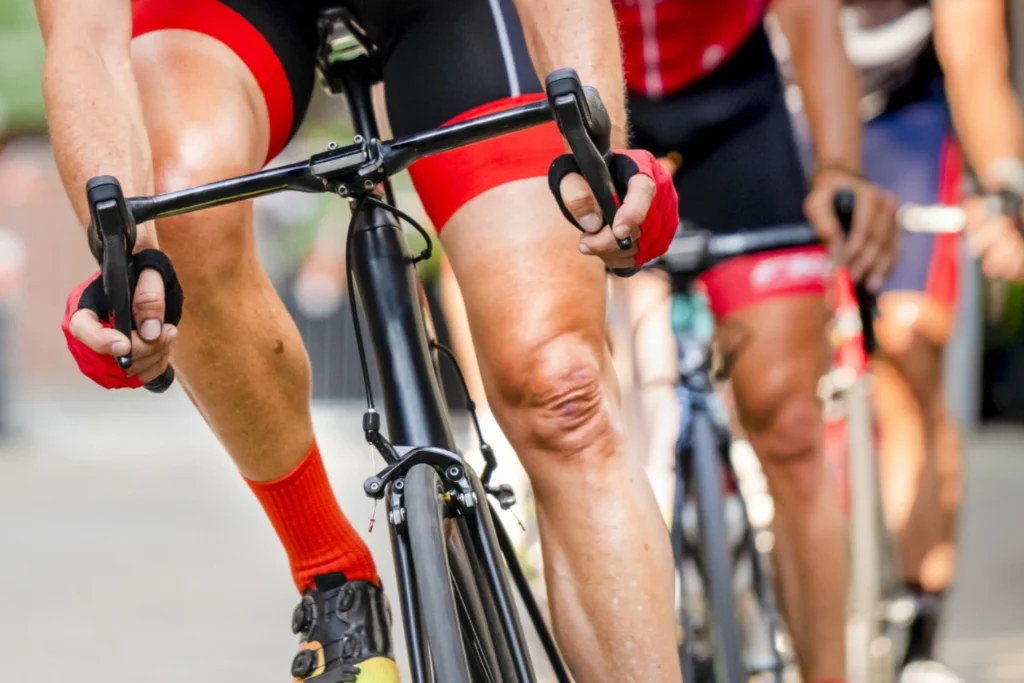
Manchester’s cycling infrastructure is growing, but road cyclists and mountain bikers must learn basic cycling injury first aid.
- Road Rash and Cuts
This is usually common in Manchester traffic situations, so it is best to clean wounds gently with sterile water when it happens.
Apply antiseptic to prevent infection and cover with a sterile gauze. This should help you heal in no time, but you can also seek medical attention if it’s a deep cut or embedded debris
- Wrist and Shoulder Injuries
Falls often cause wrist sprains or shoulder dislocations, and the best way to handle this is to immobilise the area immediately.
Apply ice through a piece of clean clothing and support the arm with a sling. Please note these injuries are much more fatal, and this is only a first aid treatment until you get professional help.
How to Treat a Martial Arts Injury?
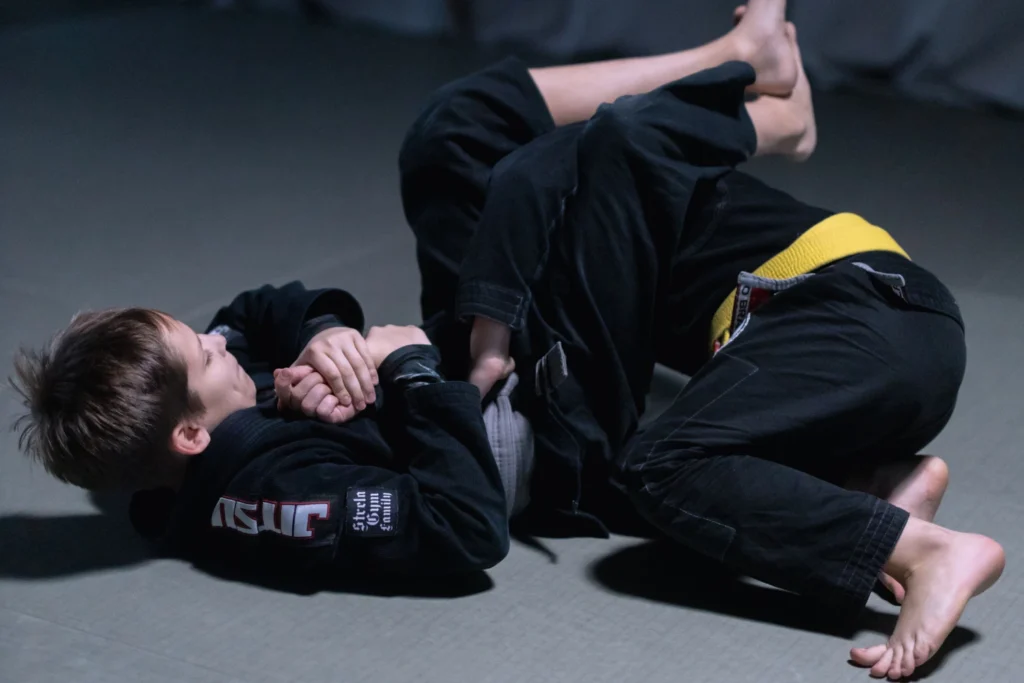
Martial arts injury first aid requires specific knowledge depending on the area affected. Here are the 2 most common treatments:
- Finger and Hand Injuries
This is common in grappling and striking arts. If this happens, immobilise injured fingers with tape or splints and apply ice immediately if it’s a knuckle injury.
Also avoid gripping activities until the injury is properly assessed by a professional.
- Neck and Spine
Sadly, the best way to handle this is to not move someone with a suspected neck injury. Don’t try to lift or help them up by yourself.
It is best to call emergency services and wait for professional help.
What Do I Do If It’s a Tennis Elbow Injury?
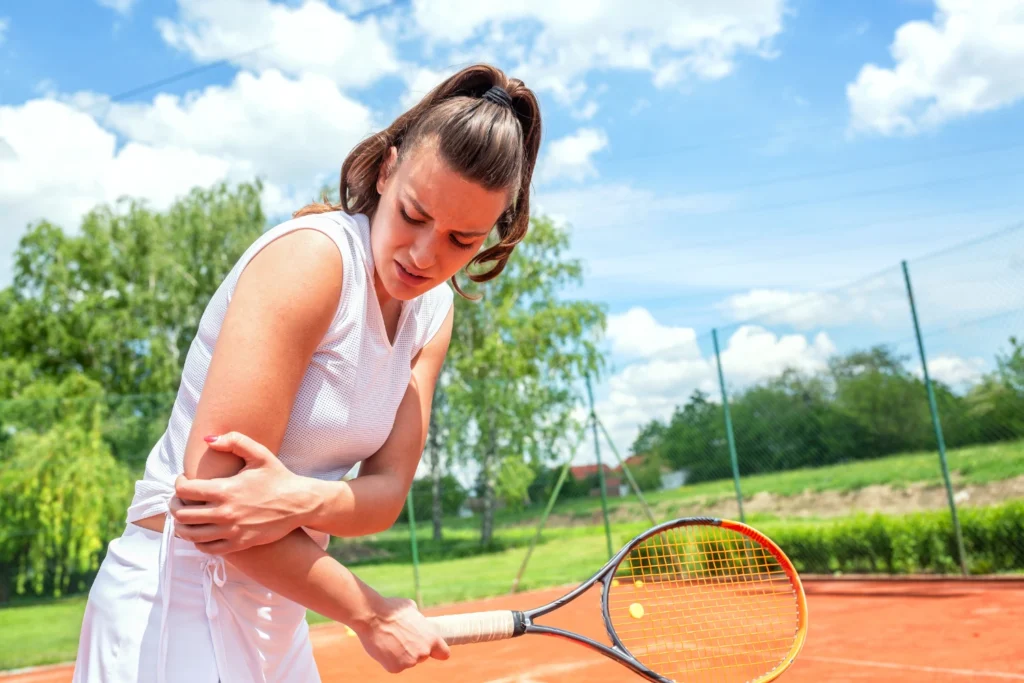
Tennis elbow first aid is important to many racquet sports popular in Manchester. Athletes must stop the aggravating activity immediately and ice the outer elbow for 15-20 minutes.
Avoid gripping activities until you fully heal and consider an elbow strap for support. You can also book an appointment for proper rehabilitation if you live in Manchester.
When to Seek Professional Help in Manchester?
While first aid for sports injuries can handle many situations, some injuries need immediate professional attention.
You should seek emergency care for suspected fractures or dislocations, head injuries, severe bleeding that won’t stop or generally any injury with numbness or tingling.
After, you might need to get on a sports injury rehabilitation programme, to aid fast recovery and get you back in top form
Frequently Asked Questions About Sports Injury First Aid
Q1: What should I do immediately after a sports injury occurs?
Stop the activity right away and assess the injury. Apply the RICE protocol (Rest, Ice, Compression, Elevation) within the first 15 minutes if possible. Never try to “play through” serious pain, as this often deteriorates the injury.
Q2: How long should I apply ice to a sports injury?
Apply ice for 15-20 minutes every 2-3 hours during the first 48 hours after injury. Always use a barrier like a towel to prevent ice burn and avoid applying ice directly to skin or for longer than 20 minutes at a time.
Q3: When should I seek professional help for a sports injury in Manchester?
Seek immediate medical attention for suspected fractures, dislocations, head injuries, severe bleeding, or injuries with numbness and tingling. Visit a Manchester sports injury clinic if pain doesn’t improve after 2-3 days of proper first aid treatment.
Q4: Can I use heat instead of ice for sports injuries?
We highly recommend using ice for the first 48-72 hours to reduce swelling and pain. Heat can be helpful later in recovery for muscle stiffness, but never use heat on acute injuries as it can increase swelling and delay healing.
Q5: What’s the most important item in a sports first aid kit?
Instant ice packs are important since they’re needed for almost every sports injury. Make sure your kit has at least 4-6 packs and check expiry dates regularly. Elastic bandages for compression are equally important.
Q6: How do I know if an ankle sprain is serious enough for professional treatment?
If you can’t bear weight after 24 hours, have severe pain that doesn’t improve with rest and ice, or notice significant swelling that doesn’t reduce, see a Manchester sports therapist immediately. Severe ankle sprains need professional assessment to prevent long-term problems.
Your Next Steps
Why wait for an injury to happen before you start building your sports injury first aid knowledge?
Learn how to assemble a proper first aid kit here and practice with the tips provided in this guide. If you stay in Manchester, it’s important to also know your local Manchester sports injury resources.
Sports injuries are part of athletic life, but proper first aid can minimize their impact. Whether you’re playing football in Altrincham, cycling through Manchester city centre, or training at your local gym, these skills will serve you well.
For professional sports injury assessment and treatment in Manchester, don’t hesitate to contact our team or book an appointment with one of qualified sports therapists for personalised care that can get you back to peak performance safely.


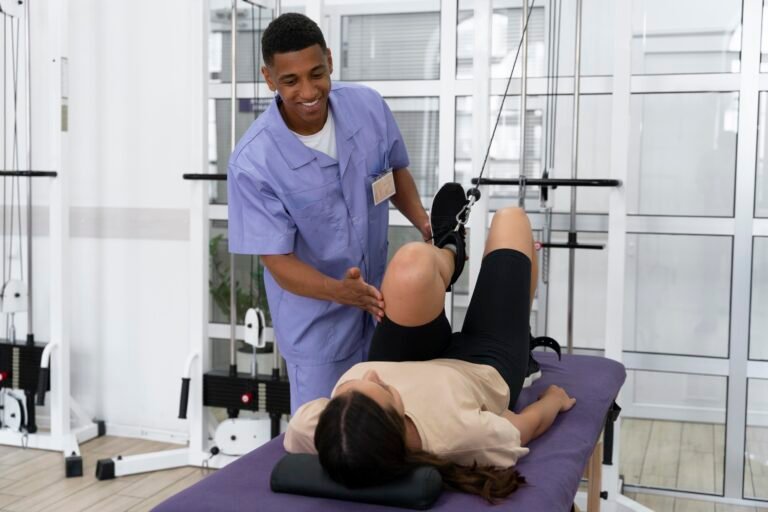
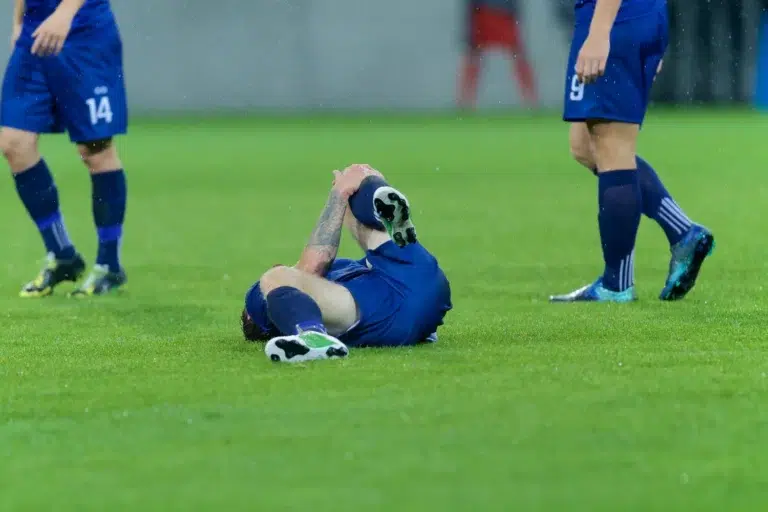
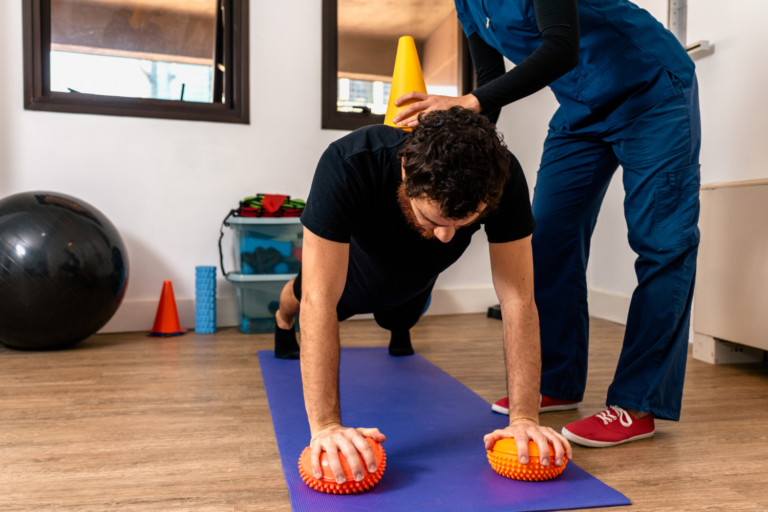
[…] If you’re nodding along, you’re not alone. Thousands of Manchester athletes deal with muscle tension, soreness, and performance plateaus that could be dramatically improved with the right sports massage approach to help them prevent or get first aid for sports injuries. […]